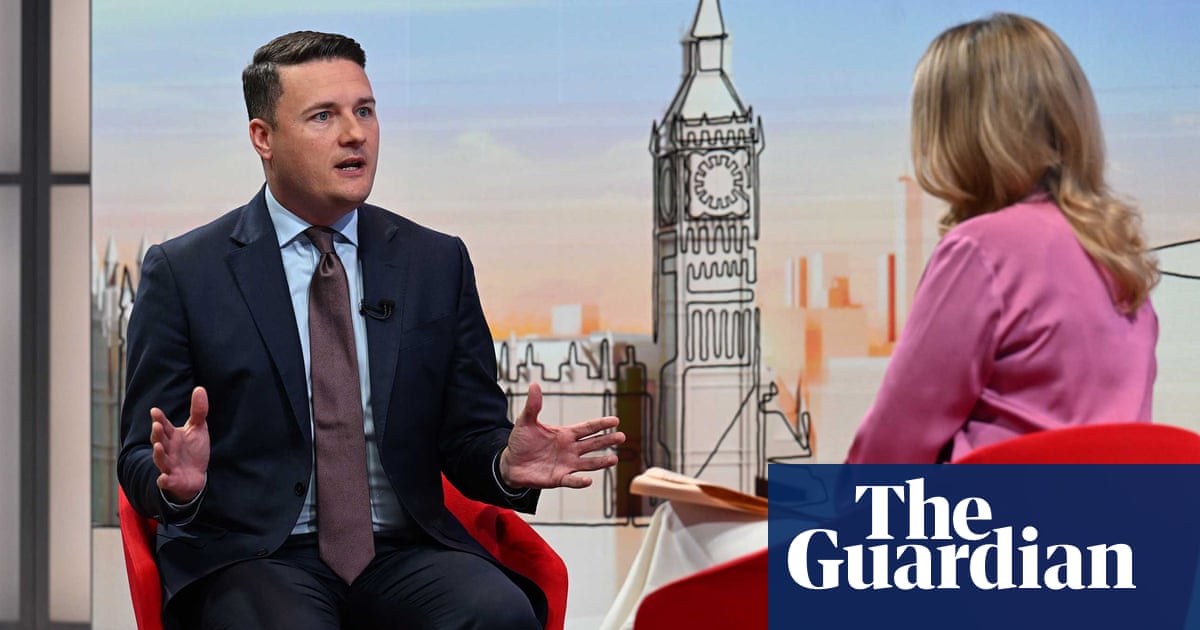Wes Streeting has said Reform is a real threat and could replace theConservativesas the main opposition party by the next election, as he urged the public to give Labour the “benefit of the doubt”.
The health secretary said Nigel Farage’s party was being treated as a “serious opposition force” afterReform’s success in the local elections, where it narrowly won a byelection from Labour and took 677 council seats, gaining control of 10 councils. Reform took most seats from the Conservatives, who lost 674, while Labour lost 187.
Speaking to the BBC’sLaura Kuenssberg, Streeting said things “take time and you don’t turn around a country … in just nine months. All I’d say to people is: we’ve got the message, we’re not daft, we haven’t got our heads in the sand. All I ask people for is a bit of time and to give us the benefit of the doubt … We are going at those challenges as hard and fast as we can”.
He saidLabourknew that people would “look for change elsewhere” if the country did not feel different by the next election and the government would “go further and faster” towards safer streets, more secure borders, waiting lists falling and the cost of living improving.
On Sky News, Streeting made clear that Reform was being taken seriously as an alternative challenger to the Conservatives. “I think Reform is definitely a real threat and one that we take seriously. I think there’s clearly, on the right of British politics, a realignment taking place,” he said.
“It’s not yet clear whether at the next general election it will be Reform or the Conservatives that are Labour’s main challengers, but we’ve got to take that threat seriously. In that spirit, I think Reform does deserve more airtime and scrutiny of their policies.”
Asked if he thought of Reform as Labour’s “most serious opposition”, he said: “I certainly do treat them as a serious opposition force.
“I don’t know whether it will be Reform or the Conservatives that emerge as the main threat. I don’t have a horse in that race, but like Alien vs. Predator, you don’t really want either one to win but one of them will emerge as the main challenger to Labour at the next general election.”
The Conservatives are also under pressure after the local election results.Kemi Badenoch, the Tory leader, rejected calls from local councillors for her to resign, when asked about her performance on the BBC’s Sunday with Laura Kuenssberg programme.
“What we had was Labour saying ‘all we need to do is get rid of the Conservatives and everything will be better’. Things got worse,” she said. “Now we have Reform saying ‘all we need to do is get rid of the Conservatives and Labour and everything will be better’. I suspect things will get worse, but protest is in the air.”
She said the Conservatives still had time to turn things around before the next election: “We live in politically volatile times and what I have been saying is that we are going to take a slow and steady way. There will be bumps along [the way] but we can do this, and we will do it in four years, not 18 years, 14 years, 13 years like the previous oppositions.”
Zia Yusuf, the Reform chair, said his party would show what it could do in local government and would be publishing a plan to deport people who have entered the country by illegal means in the first term of a Reform government.
He also defended hisparty’s plans to cut diversity, equality and inclusionspending at local councils where Reform has taken control. Pressed on how much money this would save, he could not give an answer but he said Reform would bring in auditors and taskforces to cut unnecessary spending.
The party is now in control of 10 councils: Kent, Nottinghamshire, Derbyshire, North and West Northamptonshire, Lincolnshire, Staffordshire, Doncaster, Lancashire and Durham.
